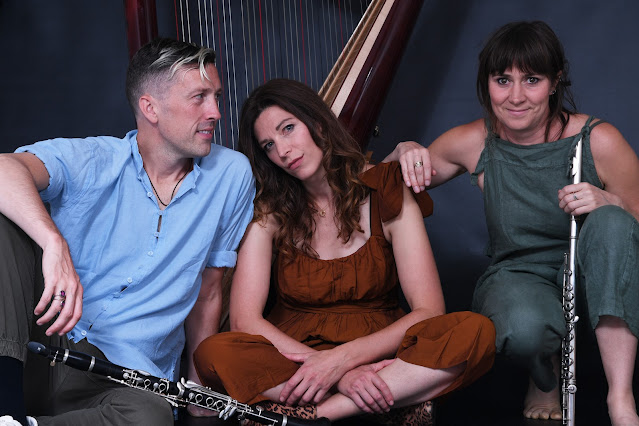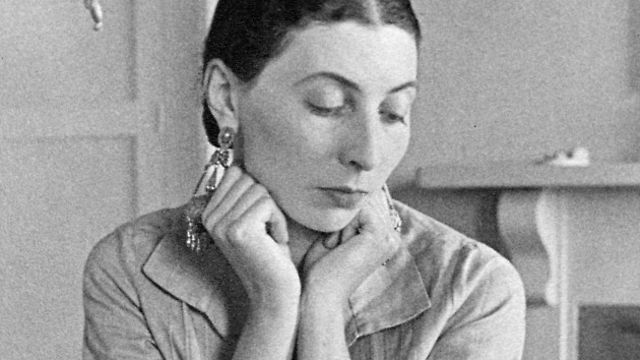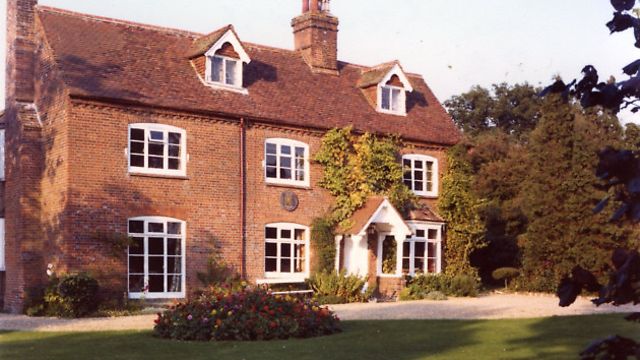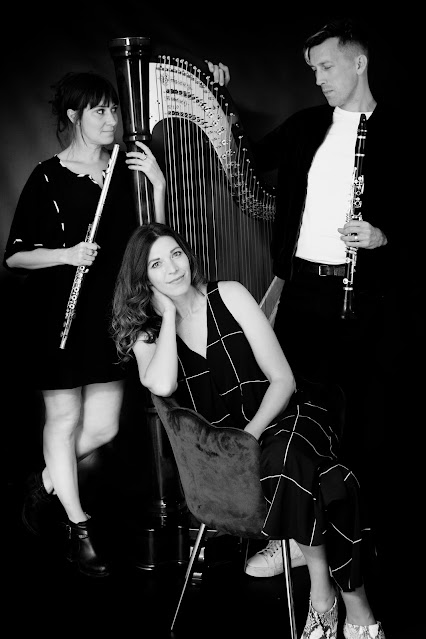 |
| Korros (Nicholas Ellis, Camilla Pay, Eliza Marshall) |
Whilst the line-up of flute, viola and harp is relatively common for trios, that of flute, clarinet and harp is quite rare and the players in Korros are not familiar with any other groups, making it something of a unique selling point. All three studied at the Royal Academy of Music with Nicholas and Eliza being in the same year. Whilst students they played Villa Lobos' Chôros 2 (for flute and clarinet) which is how it all started, as they were invited to give a series of concerts abroad and needed repertoire without piano. The harp seemed to fit well, and they not only got good feedback but loved the sound-world and textures, and enjoyed each other's playing. Now, some 20 years later, they are still together.
A typical concert programme might contain a mix of original music and pieces that they have reworked. But as there is little original repertoire for the line-up (and certainly nothing approaching the stature of Debussy's Sonata for flute, viola and harp), they do not feel so bound by the canon. They can choose whatever they feel they want to play. One of the lockdown projects was Tchaikovsky's complete Nutcracker Suite.
 |
| Elizabeth Poston wearing her old French shepherd's coat. (Image Margaret Ashby - Credit Archant) |
Stravinsky wrote his short Epitaphium for flute, clarinet and harp in 1959 (it was the first work by Stravinsky where he ordered the harmony serially throughout), and the group long thought this the first work for this particular line up (but in fact, Elizabeth Poston pipped Stravinsky to the post). Other major works for this line-up include a piece by Luciano Berio inspired by the Stravinsky, and a work by French composer Henri Tomasi (1901-1971). The fame of the Debussy Sonata seems to have led to a far greater number of works for that line up, but when chatting to Nicholas, Camilla and Eliza, they felt that the clarinet replaces the viola rather well and the instruments blend so beautifully.
They came across Elizabeth Poston's trio because Camilla went on to a harpist forum asking about music by female composers, intending include more in their repertoire. One harpist recommended Poston's trio and it turned out that she was Poston's great grand niece. It was published by Chester's but the score took ages to arrive, and finally appeared during lockdown. This meant that they had time to think about what to do with the work, and to research Elizabeth Poston. They got in touch of John Alabaster who has catalogue her music, and discovered she had written a lot for solo harp and for flute and harp, so there seemed the beginnings of a programme. Though getting the music for these pieces rather felt like disappearing down a rabbit hole.
They found a harp solo in the British Library, whilst a harpist in Wales had premiered lots of Poston's music and still had the original scores (she tended to give them to the performers), but they were not easily to hand. A month before the recording was due to start, the manuscripts for some of Poston's flute and harp duets appeared, and Nicholas took them on his holidays and transcribed them. This was music that everyone assumed had been lost.
 |
| Elizabeth Poston in the 1930s (Photo credit Archant) |
Poston's trio was a commission from Harpenden Music Society and was intended for three major players of the day, harpist Maria Korchinska, clarinettist Thea King and flautist Wilfred Smith. It is worth bearing in mind that the modern pedal harp only developed in Paris in the 19th century, and thanks to new works by Debussy and Ravel, and the teaching at the Paris Conservatoire, the mid-20th century had something of an explosion of fine harpists, include Maria Korchinska. Also, Poston worked a lot for the BBC writing sound-tracks where the harp was fruitfully used. So these factors seems to have come together in creating the work.
Poston as a person seems to have been bright, she spoke lots of languages, was interested in people and wrote 1000s of letters. Her compositions reveal both her love for nature and her dismay that the Hertfordshire countryside was being destroyed, what she called the uglification of the countryside. The trio reflects many of these element. There was an element of mystery to Poston too, she worked as a spy during the Second World War, and there is an element of mystery to the music too.
Nicholas, Eliza and Camilla are all nature lovers themselves, and they feel that this love comes across in the music of the trio, particular the third movement. They felt such an affinity with the music that the trio felt like 'our piece', and all four movements suit how they like to play. Poston's music mixes modernism with a gift for melody, never becoming too kitsch and combining English pastoral with Debussy and Stravinsky.
 |
| Rooks Nest House (Photo Margaret Ashby - Credit Archant) |
She lived in a farmhouse near Stevenage, Rook's Nest, which had been EM Forster's childhood home and which was the model for Howard's End. She lived there with lots of animals, developing a reputation for eccentricity and avoiding the London scene. She seems to have had a close personal relationship with Peter Warlock, though she rarely spoke of it. The group feel that this sense of privacy and intimacy comes over in the music too. The second movement is its emotional heart, called Pastorale Nostalgica, it includes moments which reflect her dismay at the uglification.
The three players were lucky enough to be able to visit Rook's Nest when they performed the trio in the local church (where Poston played the organ). And they were able to both see the view that she loved and also the ugly industrial buildings on the horizon.
For other pieces on the album, one of the themes they wanted to explore
was female composers. They contacted Catrin Finch (who had been at RAM
the same time as them), as both a harpist and composer they knew she
wrote well for her instrument and having a piece by her brought back
something of a nostalgia for student days. They three all loved Cheryl
Frances-Hoad's music, but did not know her personally. Nicholas got in
touch, and it turned out she had a Vocalise for soprano, clarinet
and harp which she had written at the age of 14 and she was happy to
transcribe it for them. Nicholas commented that so many composers are
sensitive about their early works but Cheryl was completely cool, in
fact the work was important to her as she had won a competition with it.
 |
| Korros (Eliza Marshall, Camilla Pay, Nicholas Ellis) |
Also on the disc is Howard Blake's Pennillion for flute, clarinet and harp, one of the first pieces that Korros played. There are other links, Howard Blake, Poston and Catrin Finch are each, in their way, composers who easily cross genres. Nicholas has spent years arranging music for the ensemble, so it felt apposite to be able to include a work of his on the disc. This is based on a piano piece he wrote, and harks back to the 1930s.
Outside of the group, the players have busy careers working in the West End (Eliza has the chair at The Lion King), doing commercial and studio work, and orchestral work, as well as projects of their own.
They are very grateful to support for the new album from the Ambache Trust (which supports projects related to women composers) and Finzi Friends. Howard Blake was also a huge support, spending an afternoon going through his music with them and arranging the final track, Penillion for them.
Apart from actually launching the album, the group's plans for this year are quite low-key. They have found that many events planned for 2020 have been rescheduled for 2022, so are concentrating on planning next year's concert series, including performing works from the album. They are also planning to continue working with Convivium and are thinking about their next disc.
The official launch concert is in July in the chapel of the House of St Barnabas in Soho, but other plans include salon concerts and a collaboration with a sitar player. They have always loved working with different composers, and are looking forward to thinking outside the box when it comes to collaborators.
Nostalgica: Nicholas Ellis, Elisabeth Poston, Howard Blake, Cheryl Frances-Hoad, Catrin Finch - Korros, Convivium Records CR071
Never miss out on future posts by following us
The blog is free, but I'd be delighted if you were to show your appreciation by buying me a coffee.
Elsewhere on this blog
- Songs of Loneliness: Noah Max's haunting and disturbing chamber music on a disc from Toccata Classics - record review
- Rivales: Veronique Gens and Sandrine Piau celebrate two eminent personalities of 18th century French opera - record review
- Unforgettable: Pärt and White from SANSARA and Fretwork at St John's Smith Square - concert review
- The Saxophone Craze: saxophonist Jonathan Radford and pianist Ashley Fripp launch their new disc at the Royal Over-Seas League - concert review
- Exploring Weinberg: two works for cello & orchestra alongside the last Chamber Symphony No. 4 in a lovely disc from French ensemble Les Metamorphoses & cellist Pieter Wispelwey - record review
- From the Shenandoah Valley to Kensington Gardens: I chat to Ella Marchment about her new role at Shenandoah Conservatory & directing the UK premiere of Mark Adamo's Little Women - interview
- Virtuoso voices: Hilary Cronin and Hugh Cutting in motets by Handel and Vivaldi with London Handel Players - concert review
- Beauty and the Seven Beasts: using seven composers and mixing film with live performance, The Opera Story's latest show is a remarkable triumph - opera review
- Historical stagecraft & modern sensibilities: a powerful Tamerlano from Cambridge Handel Opera Company - opera review
- The Handmaid's Tale: Poul Ruders operatic version of Margaret Atwood's dystopic tale returns in a stark new production with an astonishing performance from Kate Lindsey in the title role - opera review
- British Piano Concertos: Simon Callaghan revives six undeservedly neglected mid-Century works - record review
- Alertness and vivacity: Geoffroy Jourdain and Les Cris de Paris in Heinrich Schütz - record review
- 'Ghostly stuff' - the Tippett Quartet and Emma Abbate in Elgar's Piano Quintet at Conway Hall - concert review
- Home











No comments:
Post a Comment